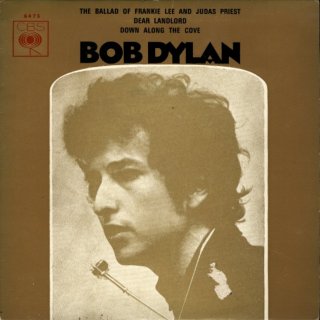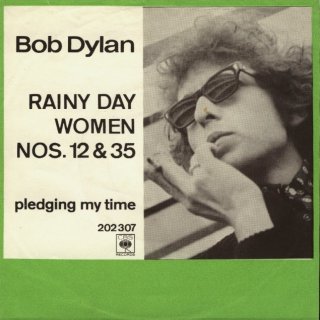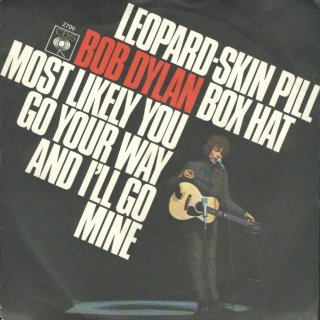Related Research Articles

Highway 61 Revisited is the sixth studio album by the American singer-songwriter Bob Dylan, released on August 30, 1965, by Columbia Records. Dylan continued the musical approach of his previous album Bringing It All Back Home (1965), using rock musicians as his backing band on every track of the album in a further departure from his primarily acoustic folk sound, except for the closing track, the 11-minute ballad "Desolation Row". Critics have focused on the innovative way Dylan combined driving, blues-based music with the subtlety of poetry to create songs that captured the political and cultural climate of contemporary America. Author Michael Gray argued that, in an important sense, the 1960s "started" with this album.

Blonde on Blonde is the seventh studio album by the American singer-songwriter Bob Dylan, released as a double album on June 20, 1966, by Columbia Records. Recording sessions began in New York in October 1965 with numerous backing musicians, including members of Dylan's live backing band, the Hawks. Though sessions continued until January 1966, they yielded only one track that made it onto the final album—"One of Us Must Know ". At producer Bob Johnston's suggestion, Dylan, keyboardist Al Kooper, and guitarist Robbie Robertson moved to the CBS studios in Nashville, Tennessee. These sessions, augmented by some of Nashville's top session musicians, were more fruitful, and in February and March all the remaining songs for the album were recorded.

"All Along the Watchtower" is a song by American singer-songwriter Bob Dylan from his eighth studio album, John Wesley Harding (1967). The song was written by Dylan and produced by Bob Johnston. The song's lyrics, which in its original version contain twelve lines, feature a conversation between a joker and a thief. The song has been subject to various interpretations; some reviewers have noted that it echoes lines in the Book of Isaiah, Chapter 21, verses 5–9. Dylan has released several different live performances, and versions of the song are included on some of his subsequent greatest hits compilations.
"Chimes of Freedom" is a song written and performed by Bob Dylan and featured on his Tom Wilson produced 1964 album Another Side of Bob Dylan. The song depicts the thoughts and feelings of the singer and his companion as they shelter from a lightning storm under a doorway after sunset. The singer expresses his solidarity with the downtrodden and oppressed, believing that the thunder is tolling in sympathy for them.
"4th Time Around" is a song by American singer-songwriter Bob Dylan, which was released as the 12th track on his seventh studio album Blonde on Blonde on June 20, 1966. The song was written by Dylan and produced by Bob Johnston. Commentators often interpret it as a parody of the Beatles' 1965 song "Norwegian Wood ". John Lennon composed "Norwegian Wood" after being influenced by the introspective lyrics of Dylan. Lennon later reflected on his feelings of paranoia when Dylan first played him "4th Time Around".
"Visions of Johanna" is a song written and performed by Bob Dylan on his 1966 album Blonde on Blonde. Several critics have acclaimed "Visions of Johanna" as one of Dylan's highest achievements in writing, praising the allusiveness and subtlety of the language. Rolling Stone included "Visions of Johanna" on their list of the 500 Greatest Songs of All Time. In 1999, Sir Andrew Motion, Poet Laureate of the United Kingdom, listed it as the greatest song lyric ever written.

"The Ballad of Frankie Lee and Judas Priest" is a song by American singer-songwriter Bob Dylan. It was released as the fifth track on his eighth studio album John Wesley Harding (1967). The track was written by Dylan and produced by Bob Johnston. It was recorded in one take on October 17, 1967, at Columbia Studio A in Nashville. The song's lyrics refer to two friends, Frankie Lee and Judas Priest. Lee asks Priest for a loan of money and Priest offers it freely. Lee spends it in a brothel over 16 days, then dies of thirst in Priest's arms. It has been suggested by commentators that the song refers to Dylan's relationship with his manager Albert Grossman or to his contractual negotiations with his record company. The song received a mixed critical reception. Dylan performed the song live in concert 20 times, from 1987 to 2000.
Sara Dylan is an American former actress and model who was the first wife of singer-songwriter Bob Dylan. In 1959, Noznisky married magazine photographer Hans Lownds; during their marriage, she was known as Sara Lownds.
"Tombstone Blues" is a song by American singer-songwriter Bob Dylan, which was released as the second track on his sixth studio album Highway 61 Revisited (1965). The song was written by Dylan, and produced by Bob Johnston. Critical interpretations of the song have suggested that the song references the Vietnam War and US President Lyndon Baines Johnson.

Bob Dylan is an American singer-songwriter. Considered one of the greatest songwriters of all time, Dylan has been a major figure in popular culture over his 60-year career. With an estimated figure of more than 125 million records sold worldwide, he is one of the best-selling musicians of all-time. Dylan added increasingly sophisticated lyrical techniques to the folk music of the early 1960s, infusing it "with the intellectualism of classic literature and poetry". His lyrics incorporated political, social and philosophical influences, defying pop music conventions and appealing to the burgeoning counterculture.

"The Times They Are a-Changin'" is a song written by Bob Dylan and released as the title track of his 1964 album of the same name. Dylan wrote the song as a deliberate attempt to create an anthem of change for the time, influenced by Irish and Scottish ballads. Released as a 45-rpm single in Britain in 1965, it reached number 9 on the UK Singles Chart. The song was not released as a single in the US. In 2019 it was certified Silver by BPI.

"Just Like a Woman" is a song by the American singer-songwriter Bob Dylan from his seventh studio album, Blonde on Blonde (1966). The song was written by Dylan and produced by Bob Johnston. Dylan allegedly wrote it on Thanksgiving Day in 1965, though some biographers doubt this, concluding that he most likely improvised the lyrics in the studio. Dylan recorded the song at Columbia Studio A in Nashville, Tennessee in March 1966. The song has been criticized for sexism or misogyny in its lyrics, and has received a mixed critical reaction. Some critics have suggested that the song was inspired by Edie Sedgwick, while other consider that it refers to Dylan's relationship with fellow folk singer Joan Baez. Retrospectively, the song has received renewed praise, and in 2011, Rolling Stone magazine ranked Dylan's version at number 232 in their list of the 500 Greatest Songs of All Time. A shorter edit was released as a single in the United States during August 1966 and peaked at number 33 on the Billboard Hot 100. The single also reached 8th place in the Australian charts, 12th place on the Belgium Ultratop Wallonia listing, 30th in the Dutch Top 40, and 38th on the RPM listing in Canada.

"Pledging My Time" is a blues song by the American singer-songwriter Bob Dylan from his seventh studio album, Blonde on Blonde (1966). The song, written by Dylan and produced by Bob Johnston, was recorded on March 8, 1966 in Nashville, Tennessee. Dylan is featured on lead vocals, harmonica, and guitar, backed by guitarist Robbie Robertson and an ensemble of veteran Nashville session men.
"To Ramona" is a song by American singer-songwriter Bob Dylan, first released on his fourth studio album, Another Side of Bob Dylan (1964). The song was written by Dylan, and produced by Tom Wilson. The lyrics were started at the May Fair Hotel in London in May 1964, and finished during a week-long stay in the Greek village of Vernilya later that month. Dylan recorded all the tracks for the album, including the song, in a single three-hour session on June 9, 1964, at Studio A, Columbia Recording Studios, New York. Its narrator advises Ramona, who is preparing to return to "the South", not to follow the advice of others. Critics have suggested several different people as inspirations for the song, including Joan Baez, Suze Rotolo, and Sara Lownds.

"Most Likely You Go Your Way and I'll Go Mine", or "Most Likely You Go Your Way (and I'll Go Mine)", is a song by the American singer-songwriter Bob Dylan. It was released as the first track on side three of his seventh studio album Blonde on Blonde (1966). The song was written by Dylan and produced by Bob Johnston. Dylan recounted that he had probably written the song after the end of a relationship. The song's narrator criticizes the lies and weakness of a woman, and says that he finds it hard to care. The final verse establishes that the woman has been unfaithful to the narrator by having a relationship with another man, as he suspected all along.
"John Wesley Harding" is a song by American singer-songwriter Bob Dylan that appears as the opening track on his 1967 album of the same name.
This is a list of books published by and about Bob Dylan.

"Obviously 5 Believers" is a song by the American singer-songwriter Bob Dylan, which was released as the last track of side three of his double album Blonde on Blonde (1966), and was the B-side to the single release of "Just Like a Woman" for releases in America and some other countries. The song was written by Dylan and produced by Bob Johnston. It was recorded at Columbia Music Row Studios, in the early morning hours of a March 9–10, 1966 session. Four takes were recorded, although the first two were incomplete. It has been interpreted as a blues song about loneliness, with critics noting similarities in melody and structure to Memphis Minnie's "Chauffeur Blues". Dylan's vocals and the musicianship of the band on the track have both received critical acclaim, although the track has been regarded as insubstantial by some commentators.
"Temporary Like Achilles" is a song by American singer-songwriter Bob Dylan that was released on side three of his double album, Blonde on Blonde (1966). The song was written by Dylan, and produced by Bob Johnston. It was recorded at Columbia Studio A, Nashville, Tennessee on March 9, 1966. The song is a blues number that incorporates elements of Dylan's incomplete "Medicine Sunday", which he had recorded with members of the Band in New York in October 1965. The song describes a narrator's frustration at being kept waiting by a woman that he wishes to be romantically involved with, who is guarded by "Achilles". Some critics have suggested that the song references the Iliad.
"I Shall Be Free No. 10" is a song by American singer-songwriter Bob Dylan, which was released as the fifth track on his fourth studio album Another Side of Bob Dylan (1964). The song was written by Dylan and produced by Tom Wilson. The song is a humorous talking blues, indebted to earlier songs including Lead Belly's "We Shall Be Free". Dylan opens the song by proclaiming that he is normal and average, but then acknowledges his reputation by singing the self-aware doggerel "Yippee! I'm a poet, and I know it/ Hope I don't blow it".
References
- ↑ Schulberg, Budd (1 May 2005). "The Kane Mutiny". New York Times. Retrieved 10 March 2010.
- ↑ Shaw, Kevin (21 July 2009). "So Long as Men Can Breathe by Clinton Heylin". PopMatters.com. Retrieved 31 January 2014.
- ↑ Peters, Susan (1 June 2009). "Literature, So Long as Men Can Breathe". The Library Journal. Archived from the original on 8 June 2009. Retrieved 10 March 2010.
- ↑ Mark, Amanda (3 January 2013). "E Street Shuffle: The Glory Days of Bruce Springsteen and the E Street Band". New York Journal of Books. Retrieved 11 March 2014.
- ↑ Robb, John (8 June 2016). "Anarchy In The Year Zero: Clinton Heylin: book review". louderthanwar.com. Retrieved 30 June 2016.
- ↑ "They're Selling Postcards of the Stoning". Dublin Review of Books. Archived from the original on 6 August 2019. Retrieved 9 April 2017.
- ↑ ""Bob Dylan: The 1966 Live Recordings" to be Released in November". bobdylan.com. 27 September 2016. Archived from the original on 30 September 2016. Retrieved 28 September 2016.
- ↑ Motion, Andrew (8 April 2021). "Bob Dylan — from respected young songwriter to Voice of a Generation". The Spectator. Retrieved 8 April 2021.
- ↑ "Trouble In Mind website". route-online.com. Retrieved 31 October 2017.